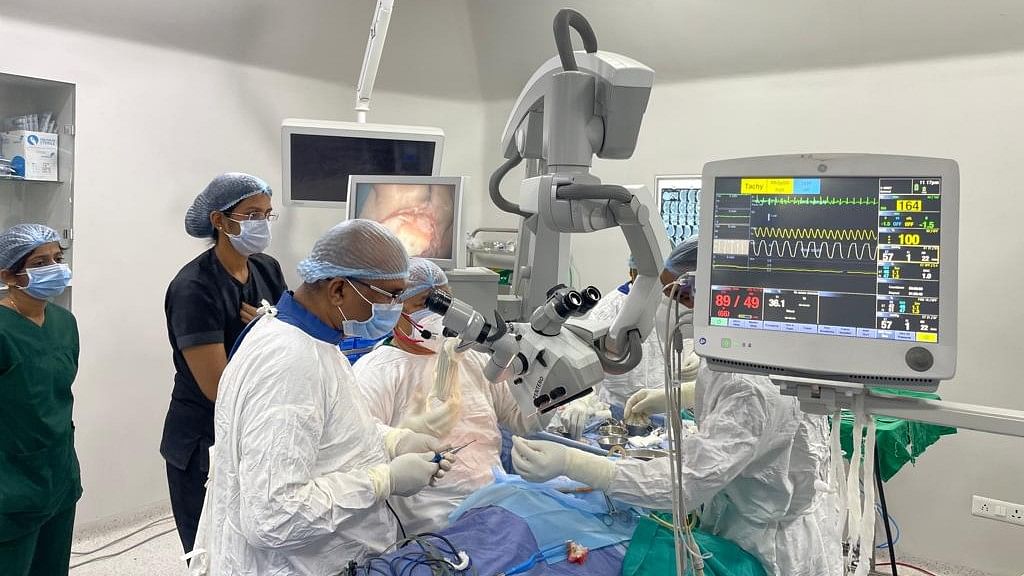
DH Photo
Bengaluru: For decades, surgeons have been turning the music on to calm nerves while at work. The nuances of this dynamic between music and stress in the operating room, however, have remained largely unclear.
A recent study by researchers at NIMHANS compared stress and neurocognitive functions between microsurgeries performed by neurosurgeons without and with music – instrumental compositions based on Hindustani/North Indian ragas – before and during the surgeries.
The findings indicate that music reduces subjective stress and influences neurocognition. They also offer leads to possible explorations of the long-term effects of music on surgical performance.
The paper – 'Effect of Music Listening on Neurocognition, Stress, and Performance in Neurosurgeons During Microsurgery' – was published in World Neurosurgery in July. Dr Shantala Hegde, Additional Professor and Consultant Neuropsychologist, NIMHANS, and corresponding author of the paper, noted that music, while perceived to have a “calming effect” on the surgeons, was by no means the definitive stress-buster across situations.
“Music-based intervention in surgeries is gaining traction but you can’t use any music in any scenario. A song from a movie, for instance, can elevate the listener’s mood but it can also set off excitement that disrupts concentration. The response also, obviously, changes with individuals,” she told DH.
Dr Shantala, a trained Hindustani vocalist, heads the music cognition lab at the Department of Clinical Psychology, NIMHANS. The lab examines the neural basis of music perception and cognition and the effects of music-based intervention on neurological and psychiatric conditions.
Shradha Chandrasekar is the first author of the paper which has Dr Dwarkanath Srinivas (Professor of Neurosurgery) and Dr Talakad N. Satyaprabha (Professor of Neurophysiology) as co-authors.
The pilot phase of the study had 23 neurosurgeons rate Hindustani raga-based compositions they believed were suitable during surgery. For the main phase, five top-rated excerpts, with instruments like flute and santoor, were picked.
These were either raga-based or light instrumental tunes: mangal bhairav (a sombre-toned morning raga), gorakh kalyan, pahadi (an evening raga with roots in Kashmiri folk music), mishra kaafi (tune), and pahadi (tune).
In this phase, three neurosurgeons performed 16 surgeries, eight with and eight without music. These surgeons were not part of the pilot phase.
“Thirty minutes ahead of the surgeries, the surgeons were asked to focus on the music on headphones. The idea was to see how oriented they were as they stepped into the OR when compared with their no-music condition,” Dr Shantala said.
During the surgeries, the selected tracks, 20 minutes to one hour in duration, were played in the OR on speakers, at “comfortable” volumes.
Memory, focus, response
Three neurocognitive functions were assessed in the music and no-music conditions: attention-concentration, working memory and response inhibition based on accuracy and reaction time. The general trend reflected better performance in conditions with music. The researchers also noted a “significant” speed-accuracy trade-off in the presence of music, where accuracy improved with decreasing speed.
Post-surgery values of stress and complexity did not show significant differences between the groups. The surgeons, however, reported that they seemed to tune out the music when they were engaged in complex surgical steps and focused on the music between these steps. One of the surgeons said he found himself focusing on the music “consciously” during a particularly stressful surgery to “relax and improve focus”.
The paper underlines the need to address concerns about the mental well-being of surgeons which impacts patient outcomes. “Measuring stress indicators like heart rate variability can throw up greater insights on how music impacts the surgeon’s mental state. These findings are in the right direction and can steer more detailed research, with larger participant groups,” Dr Shantala said.